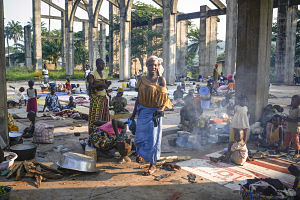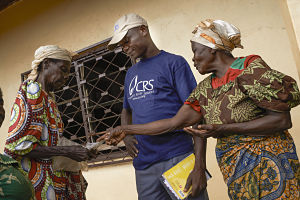Archbishop Dieudonne Nzapalainga and Imam Omour Kobine of Bangui pray together during a tour to spread the word of tolerance and reconciliation. Photo by Sam Phelps for CRS
“The shooting began in strategic areas throughout Bangui around 3 am on the morning of Dec 5
th. When I received a call at 5:30 am, I knew the situation was going to be bad. I remembered how bad things were in March when we’d had to be evacuated and my stomach filled with dread. We were on lock down from Thursday morning until Saturday morning. Thankfully we were able to communicate with all our national staff, but many were hibernating in their homes in fear and some had fled, seeking refuge in parish compounds or with family members in quieter parts of town. My 2 bedroom apartment quickly became a makeshift office for my 7-person expat team. As the only residence with internet connection 24-7, we set up shop and began working from my apartment.
On Sunday we got the green light to begin moving around town, with caution. The first trip was to the airport. The only other vehicles on the road were fellow humanitarians and French military. Bangui still felt very tense. We hurried quickly back home.
By Tuesday our team was prepared to roll up our sleeves and get to work.
Before setting out, I loaded our pick-up truck with some provisions to take to the CRS office on the way. Earlier that morning we’d been told that the company that employs our office guards was stuck and could not bring them food. So we gathered some items from our stock and left the compound to explore Bangui.
The streets were deserted. It was eerily quiet. During the short drive between our residence and the office we were waved through two checkpoints run by French and African Union troops. We passed only a handful of other vehicles on the road. A few pedestrians walked along the side of the road. I felt like I was driving through a movie set.
Our guards opened the gate to the office and they were visibly relieved to see us. They’d clearly lost weight. I couldn’t help but think that this was just two people among tens of thousands in need. While aid agencies have begun to access the more than 20 spontaneous camps for displaced people that have popped up all over Bangui since fighting erupted the morning of December 5
th, the needs are much greater than what we can respond to. Security still hampers access to some sites and stocks of humanitarian supplies are limited.
The second stop was the Archbishop’s compound, to meet with Archbishop Nzapalainga and the Chief Imam, Omar Kobine, to discuss the gaps in support for displaced people. An estimated 160,000 people have fled their homes in fear of violence and are camped around the city. Many have not yet been reached.
Thousands of people displaced by the violence are camping out at at a Catholic church under construction in the capital Bangui, exposed to the sun, the rain and the chilly December nights. Photo by Sam Phelps by CRS
At Archbishop Nzapalainga’s compound, St Paul’s, and in the grounds of the church, we were met with clusters of people who had come to seek safety and refuge there. An estimated 13,000 people are either in the buildings or camped out. About ten tents dot the ground, but most everyone else is exposed to the sun, the rain and the chilly December nights. The Archbishop is essentially managing the camp as well as advising the parish priests who are hosting displaced people all over Bangui. He looked exhausted and overwhelmed – but he still welcomed us into his home with open arms. The view of the Oubangui river from the Archbishop’s compound brought a few moments of much-needed serenity.
In a touching symbol of inter-religious togetherness, we learned that the Archbishop was also hosting Imam Kobine in his compound. I sincerely hope that their example can pave the way for others.
After discussing the needs and gaps in the ad hoc camps for displaced people, we began to talk about the urgent need to stop the cycle of revenge attacks in Bangui and to encourage peace and reconciliation. The meeting gained serious momentum and we planned a follow-on meeting for the next morning, with the promise to bring representatives from the Muslim youth association and the Christian youth association, to begin mapping out concrete activities to encourage social cohesion in neighborhoods. Activities that could begin immediately. It was an inspirational meeting and I hope and pray that the tireless efforts of these few brave souls can have an impact on stopping the dangerous cycle of violence in CAR.
CRS, together with its partners, has distributed thousands of food vouchers in the town of Boda, Lobaye District, that can be exchanged for food from local vendors. Photo by Sam Phelps for CRS
Catholic Relief Services, Cordaid (Caritas Netherlands) and Caritas/CAR are working together to identify how we can support the tireless efforts of those managing the spontaneous camps throughout Bangui and to stop the violence in the capital and beyond.
As we drove back to town from the Archbishop’s compound, the sun was setting on the Oubangui river – a small moment of beauty in the midst of all this ugliness. I soaked up the beauty. The sound of a French military helicopter patrolling the skies brought me back to reality and I said a small prayer. Each day is getting a bit better.
Read more about CRS' work in CAR.








